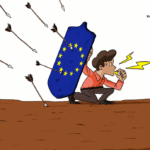For over three years now, the whistleblower directive has been at the heart of Eurocadres’ activities. During the General Assembly in Lisbon, Eurocadres’ members adopted a resolution its demanding that the existing flaws of the directive should be fixed on national level.

Eliminating psychosocial risks at the workplace is a key demand for Eurocadres. Occupational health and safety must tackle both physical and mental wellbeing.

Eurocadres is calling for better re- and upskilling possibilities for workers through a resolution that was adopted at the General Assembly on 17 October.

Eurocadres’ two-day conference “Time to end stress: Professionals & Managers in the front line” kicks off today in Lisbon. The conference will address the challenges in tackling psychosocial risks at workplaces and what steps forward there are. Eurocadres will also launch the EndStress.EU campaign.

On 17 October 2019, Eurocadres members gather in Lisbon for the General Assembly. The GA will debate three resolutions: one on re- and upskilling, second one on the transposition of the whistleblower directive and a third one calling for a directive on psychosocial risks.

The International Bar Association (IBA) launched a report on sexual harassment in the legal profession in mid-May. The results show a horrifying truth about the frequency of bullying and harassment.

On World Day for Safety and Health at Work, the European Alliance for Mental Health – Employment and Work (EUMH Alliance) highlights the importance of including mental health as part of a timely debate on the Future of Work in the EU.

Together with Transparency International EU & Whistleblowing International Network, Eurocadres is organising a civil society event in Strasbourg on 17 April.

The European Commission published a new report on ethical guidelines for Artificial Intelligence (AI), and launched a pilot project on AI. It has set-out key requirements for trustworthy AI, as well as launching a large-scale pilot phase for feedback from stakeholders.

The recently published ETUC/ETUI study, ‘Benchmarking Working Europe 2019’, reports that despite the rise in the number of highly skilled professionals, within the European Union (EU), there remains a gap between those highly-skilled workers and the number of appropriate jobs available to them.

Addressing today’s Tripartite Social Summit for Growth and Employment, Eurocadres President, Martin Jefflén, profiled the successful whistleblowers protection campaign, which through the hard work of trade unions and NGOs, has led to a stronger Directive, giving more options for reporting crime and corruption and better protection for whistleblowers.

The European Parliament, the Commission and the Council have reached a preliminary agreement on Horizon Europe for 2021 to 2027. Horizon Europe is expected to build on the achievements and success of the current research and innovation programme (Horizon 2020).
Late last night the Council of the EU, the European Parliament and the European Commission reached a provisional agreement on the whistleblower protection directive.

European women are more and more highly-skilled, and a growing number of women graduate with tertiary education. Not only is advancing to managerial positions a challenge, but the wages of women are also lagging far behind.

The petition of Eurocadres and WeMove.EU which had gathered over 100,000 signatures was handed over in preparation of one of the last trilogue negotiations on the whistleblower protection directive.

The European social partners agreed on a new work programme for the years 2019-2021. As a recognised European social partner Eurocadres has been involved in the negotiations.

Eurocadres will offer its member organisations a number of training seminars on the issue of whistleblower protection which will take place this year and beginning of 2020.

Eurocadres broadly welcomes today’s provisional agreement between the European Commission, the European Parliament and the Council to support the Commission’s proposal to set-up a European Labour Authority (ELA).

Newsletter ILO supporting a Brighter Future for Work 12.2.2019Employment The international Labour Organisation’s (ILOs) Global Commission on the Future of Work has published a new report titled: ‘Working for a…

Sign the new petition for a strong whistleblower protection direction. Eurocadres is teaming up with WeMove.EU to demand improvements in the directive.

